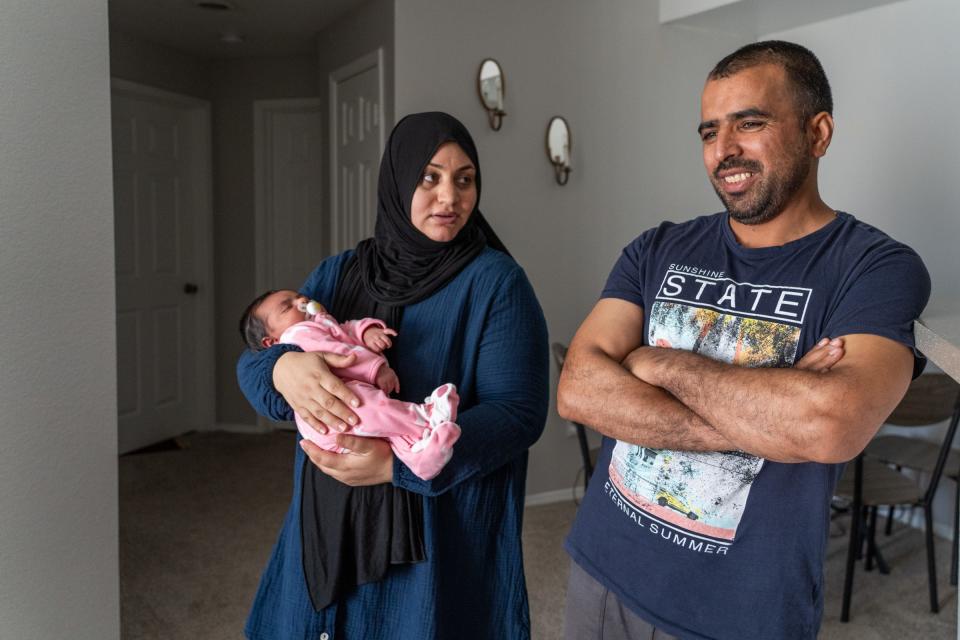From his very first year of life, Mir Shamsi has made a habit of overcoming harrowing circumstances.
In winter 1986, amid a 10-year-long conflict between Soviet forces and mujahedeen rebels, a bomb destroyed his family’s home in the suburbs of Kabul, Afghanistan. The blast killed three of his sisters and nine others.
Shamsi — then just 9 months old — was gravely injured, requiring surgeries and treatments for years afterward. A scar above his temple and several along his right side remain to this day.
Advertisement
Advertisement
Doctors did not expect he would live beyond his fifth birthday.
But he did, and he built a life for himself. He became an engineer and secured a good job working on projects funded by U.S. Army Corps of Engineers. He bought his own house and a car in Kabul. He met his now-wife, Shameem, and they started a family.
Then, in 2021, his life changed again when he learned the U.S. was withdrawing its forces from Afghanistan.
He knew his work for American interests could make him a target, so he secured spots on a flight for himself, his wife and their two children on a U.S. Air Force plane. When they arrived at the Kabul airport, it was so swarmed with people — all of them desperate to escape the Taliban’s rule — that they couldn’t get through to the gate.
Advertisement
Advertisement
Miraculously, he got them onto another flight, this time to Romania. The Shamsis found themselves living in a single room with three other refugee families in Bucharest.
“It was very hard,” he said.
Because Mir spoke English, he landed a job as an engineer for a construction company. But his dream was to move to the U.S., where he had a close friend living in Austin. (“He never told me anything” about Austin’s weather, he says now with a laugh.)
After months of delays and expensive medical checkups, Shamsi was shocked — and thrilled — to finally receive his family’s special immigrant visas.
Advertisement
Advertisement
More in U.S.
They moved here in March 2023 and settled into an apartment complex in North Austin. Shamsi again found work as a quality control manager for federal contractors in Conroe.

Mir Shamsi talks with wife Shameem as she holds their new baby, Liya, in their Austin home. The family came to the U.S. from Afghanistan after Mir worked with the U.S. Army Corps of Engineers. He is now in treatment for brain cancer.
But soon after he arrived, the 38-year-old learned he had to undergo surgery for a brain tumor. He held onto his job for as long as he could before his employer ended his contract in March. Then he began chemotherapy in July. Doctors told him the chemotherapy would take a year, but the tumor has not shrunk as much as they hoped it would by this point.
Not wanting to waste any time, Mir began pursuing an online master’s degree program. While his friend helped him pay for classes, Mir is not sure he will be able to afford the program next semester.
Meanwhile, Shameem, 31, gave birth to a third daughter on Oct. 11. Once certified to teach high school biology in Afghanistan, she is working to obtain an U.S. high school equivalency degree and learn English, which will likely take several years.
Advertisement
Advertisement
Though the family feels fortunate to have Medicaid and food stamps, their lack of income puts them in a dire situation. Interfaith Action of Central Texas has paid several months of rent for the family’s apartment and contributed furniture and supplies, but they need more help than the organization alone can provide.
“Here, we must start from zero again,” Mir says.
Nevertheless, speaking about the difficult experiences that led him here, Mir is incredibly upbeat, as if still amazed that he made it to the U.S. His energy radiates from his smile, his bright eyes and his expressive hand motions, and he lights up when talking about his daughters, Hafasa, 6, and Asmah, 5, who are in kindergarten and first grade.
With the calm of a trained engineer and a practiced optimist, he predicts it will take about 10 years to build a new life in the U.S. He knows his cancer adds significant uncertainty to that estimate.
Advertisement
Advertisement
“When I made my calculation for the future, I said that … I need at least, maybe more than 10 years,” he says. “But we will see. If (I am) alive, maybe we can do otherwise. It’s related to the gods.”
The Shamsi family’s wishes
Rent assistance; baby gear; baby crib; diapers; baby clothes; stroller; car seat; bassinet; couch; TV and TV stand; beds for two kids; help with internet costs; assistance with phone bills; smartphone; pressure cooker; electric kettle; sheets and blankets; assistance with car insurance; gas gift cards; laptops and a monitor; iPads for kids; CD writer for laptop; printer; a toy train set with table; gift cards to Walmart, H-E-B and Target. Their wish list is available on Amazon.
Nominated by: Interfaith Action for Central Texas, 5307 Airport Blvd., Suite B and C, Austin, Texas, 78751. 512-386-9145, interfaithtexas.org
Its mission: iACT cultivates peace and respect through interfaith dialogue, service and celebration.
Use the form below or click here:https://statesmansfc.kimbia.com/statesmanseasonforcaring
This article originally appeared on Austin American-Statesman: Season for Caring: Brain cancer threatens Afghan engineer’s new life
EMEA Tribune is not involved in this news article, it is taken from our partners and or from the News Agencies. Copyright and Credit go to the News Agencies, email news@emeatribune.com Follow our WhatsApp verified Channel



